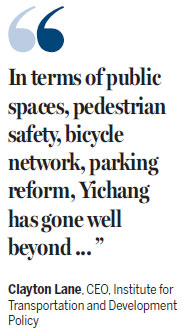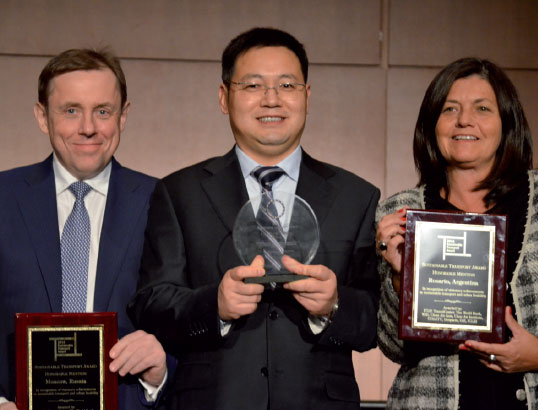Yichang, Hubei province cited for sustainable transit
Updated: 2016-01-15 12:52
By Hua Shengdun in Washington(China Daily USA)
|
||||||||
Yichang in Hubei province is the winner of the 12th annual Sustainable Transport Award.
The award recognizes leadership, vision and achievement in sustainable transportation and urban livability. The ceremony was held at the Walter Convention Center on Tuesday in Washington.
Moscow and Rosario, Argentina were the other two finalists.
It was the second time that a Chinese city has won the award since its inception in 2005. Guangzhou, Guangdong province, was the 2011 winner for its Bus Rapid Transit (BRT) system, which opened in February 2010.
Guangzhou, the third-largest city in China, was described that year as "the system that breaks the mold of low to medium capacity BRT that was becoming entrenched in Asia, and is the first 'metro replacement' level BRT system outside South America".
Drastic improvement" has been made over the past year in Yichang because of the BRT system, according to Clayton Lane, chief executive officer of the Institute for Transportation and Development Policy (ITDP), which oversees the award.
The long and narrow terrain of Yichang, a prefecture level city, and its unevenly distributed population make designing an efficient public transportation system a difficult task for city planners, according to Mao Chuanqiang, vice-mayor of Yichang.
The city opened two BRT corridors in 2015, from the city center southward for 13 kilometers with 22 stations, and northward for 10 kilometers with 15 stations to address Yichang's geographic features.
"Although the construction is complicated and in a large scale, with the help of the Asian Development Bank (ADB), we completed the three-year project in one year," Mao said. "Furthermore, we not only built up the BRT system according to the original plan but improved our subway system to make the whole traffic system more interconnective."

The reason why Yichang was chosen over the other cities was for the tremendous positive impact in people's daily lives, said Jose-Luis Irigoyen, transport director at the World Bank.
The distance on bus routes in the city was reduced by 7, 400 kilometers. Twenty percent of BRT users switched from private cars and taxis to public transportation to commute to work and travel.
In its first full month of operation, the Yichang BRT averaged 240,000 daily passenger trips on 362 BRT buses, 200 of which are new BRT buses with doors on both sides.
Mao said that designing an efficient public transportation system has been a focal point for the local government for a long time. At the time ITDP happened to be looking for a medium size city to experiment whether BRT could work out under their model.
Technical support and an $ 200 million infrastructure loan from ADB make the task so much easier for Yichang to be a convenient and vibrant city, according to Mao.
"In terms of public spaces, pedestrian safety, bicycle network, parking reform, Yichang has gone well beyond the BRT system itself. And it is really developing a model for they further." Lane said.
|
From left: Vadim Yurjev, chief director at the Moscow Traffic Control Center; Chuanqiang Mao, vice-mayor of Yichang in Hubei province; and Monica Alvarado, undersecretary at Mobility and Road Safety of Argentina at the ceremony for the annual Sustainable Transport Award at the Walter Convention Center in Washington on Tuesday. Yichang was the winner. Pan Jialiang / for China Daily |
- Massive dinosaur skeleton will spill out of hall at NY museum
- Pakistan confirms detention of top suspect of Indian airbase attack
- US sailors made 'navigational error' into Iranian waters
- 14 killed in tour bus crash in central Japan
- Blasts and gunfight in Jakarta leave six dead
- Jakarta police headquarters in first-security alert

 For police officers, duty is all in a day's work
For police officers, duty is all in a day's work
 Children at Chinese embassy in US send wishes to Dorian
Children at Chinese embassy in US send wishes to Dorian
 People prepare for Chinese New Year
People prepare for Chinese New Year
 Souvenirs and Apps make a refreshing Palace Museum
Souvenirs and Apps make a refreshing Palace Museum
 Monkey portraits by Chinese ink painting masters
Monkey portraits by Chinese ink painting masters
 SWAT members hold romantic wedding in E China
SWAT members hold romantic wedding in E China
 Stephane Peterhansel regains Dakar Rally lead
Stephane Peterhansel regains Dakar Rally lead
 Goodbye to steam trains
Goodbye to steam trains
Most Viewed
Editor's Picks

|

|

|

|

|

|
Today's Top News
National Art Museum showing 400 puppets in new exhibition
Finest Chinese porcelains expected to fetch over $28 million
Monkey portraits by Chinese ink painting masters
Beijing's movie fans in for new experience
Obama to deliver final State of the Union speech
Shooting rampage at US social services agency leaves 14 dead
Chinese bargain hunters are changing the retail game
Chinese president arrives in Turkey for G20 summit
US Weekly

|

|








